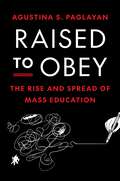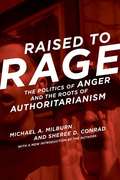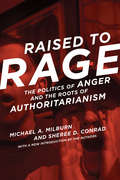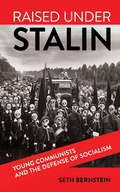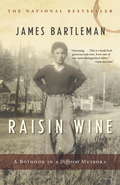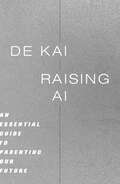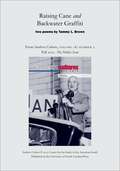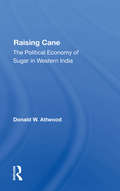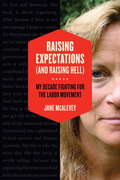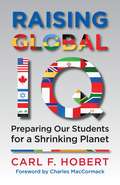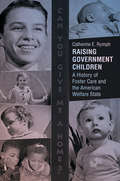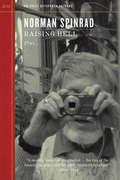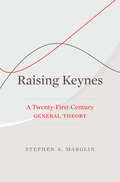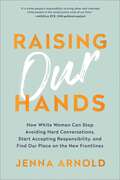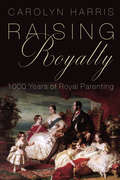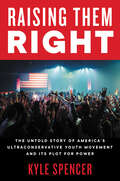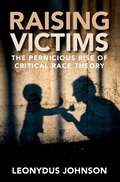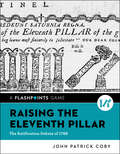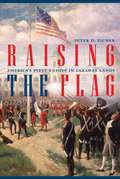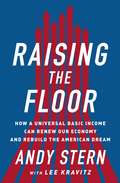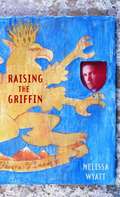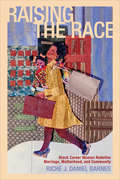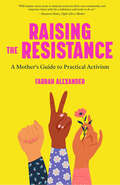- Table View
- List View
Raised to Obey: The Rise and Spread of Mass Education (The Princeton Economic History of the Western World)
by Agustina PaglayanHow the expansion of primary education in the West emerged not from democratic ideals but from the state&’s desire to control its citizensNearly every country today has universal primary education. But why did governments in the West decide to provide education to all children in the first place? In Raised to Obey, Agustina Paglayan offers an unsettling answer. The introduction of broadly accessible primary education was not mainly a response to industrialization, or fueled by democratic ideals, or even aimed at eradicating illiteracy or improving skills. It was motivated instead by elites&’ fear of the masses—and the desire to turn the &“savage,&” &“unruly,&” and &“morally flawed&” children of the lower classes into well-behaved future citizens who would obey the state and its laws.Drawing on unparalleled evidence from two centuries of education provision in Europe and the Americas, and deploying rich data that capture the expansion of primary education and its characteristics, this sweeping book offers a political history of primary schools that is both broad and deep. Paglayan shows that governments invested in primary schools when internal threats heightened political elites&’ anxiety around mass violence and the breakdown of social order.Two hundred years later, the original objective of disciplining children remains at the core of how most public schools around the world operate. The future of education systems—and their ability to reduce poverty and inequality—hinges on our ability to understand and come to terms with this troubling history.
Raised to Rage: The Politics of Anger and the Roots of Authoritarianism
by Michael A. Milburn Sheree D. ConradPoliticians routinely amplify and misdirect voters' anger and resentment to win their support. Opportunistic candidates encourage supporters to direct their anger toward Mexicans, Muslims, women, protestors, and others, rather than the true socioeconomic causes of their discontent. This book offers a compelling and novel explanation for political anger and the roots of authoritarian political attitudes. In Raised to Rage, Michael Milburn and Sheree Conrad connect vociferous opposition to immigrants, welfare, and abortion to the displacement of anger, fear, and helplessness. These emotions may be triggered by real economic and social instability, but Milburn and Conrad's research shows that the original source is in childhood brutalization or some other emotional trauma. Their research also shows that frequent experiences of physical punishment in childhood increase support in adulthood for punitive public policies, distorting the political process. Originally published in 1996, reprinted now with a new introduction by the authors that updates the empirical evidence and connects it to the current political situation, this book offers a timely consideration of a paradox in American politics: why voters are convinced by campaign rhetoric, exaggeration, and scapegoating to vote against their own interests.
Raised to Rage: The Politics of Anger and the Roots of Authoritarianism (The\mit Press Ser.)
by Michael A. Milburn Sheree D. ConradAn argument that voter anger and authoritarian political attitudes can be traced to the displacement of anger, fear, and helplessness.Politicians routinely amplify and misdirect voters' anger and resentment to win their support. Opportunistic candidates encourage supporters to direct their anger toward Mexicans, Muslims, women, protestors, and others, rather than the true socioeconomic causes of their discontent. This book offers a compelling and novel explanation for political anger and the roots of authoritarian political attitudes. In Raised to Rage, Michael Milburn and Sheree Conrad connect vociferous opposition to immigrants, welfare, and abortion to the displacement of anger, fear, and helplessness. These emotions may be triggered by real economic and social instability, but Milburn and Conrad's research shows that the original source is in childhood brutalization or some other emotional trauma. Their research also shows that frequent experiences of physical punishment in childhood increase support in adulthood for punitive public policies, distorting the political process. Originally published in 1996, reprinted now with a new introduction by the authors that updates the empirical evidence and connects it to the current political situation, this book offers a timely consideration of a paradox in American politics: why voters are convinced by campaign rhetoric, exaggeration, and scapegoating to vote against their own interests.
Raised under Stalin: Young Communists and the Defense of Socialism
by Seth BernsteinIn Raised under Stalin, Seth Bernstein shows how Stalin’s regime provided young people with opportunities as members of the Young Communist League or Komsomol even as it surrounded them with violence, shaping socialist youth culture and socialism more broadly through the threat and experience of war. Informed by declassified materials from post-Soviet archives, as well as films, memoirs, and diaries by and about youth, Raised under Stalin explains the divided status of youth for the Bolsheviks: they were the "new people" who would someday build communism, the potential soldiers who would defend the USSR, and the hooligans who might undermine it from within. Bernstein explains how, although Soviet revolutionary youth culture began as the preserve of proletarian activists, the Komsomol transformed under Stalin to become a mass organization of moral education; youth became the targets of state repression even as Stalin’s regime offered them the opportunity to participate in political culture. Raised under Stalin follows Stalinist youth into their ultimate test, World War II. Even as the war against Germany decimated the ranks of Young Communists, Bernstein finds evidence that it cemented Stalinist youth culture as a core part of socialism.
Raisin Wine: A Boyhood in a Different Muskoka
by James K. BartlemanA warm, at times hilarious, yet dark childhood memoir from a bestselling author.This memoir recalls the boyhood years of Ontario’s future lieutenant-governor, living in a dilapidated old house complete with outdoor toilet and coal oil-lamp lighting. Behind the outrageous stories, larger-than life-characters, and descriptions of the mores of a small village in the heart of Ontario’s cottage country are flashes of insight from the perspective of a child that recall the great classic Who has Seen the Wind by W.O. Mitchell.But why "a different Muskoka?" Because the boy was a half-breed kid. Visits to his mother’s reserve showed him that he was caught between two worlds. His mother’s fight with depression flowed from that dilemma. His father — the book’s main character — was a lovable, white, working class, happy-go-lucky guy who never had any money but who made the best home brew in the village — and his specialty was raisin wine.Like that raisin wine, this unusual book goes down easily and has a kick to it.
Raising AI: An Essential Guide to Parenting Our Future
by De KaiFrom the pioneer of translation AIs like Google, Yahoo, and Bing translate, an accessible and authoritative guide to AI—as well as a framework of empowerment for a future with our artificial children.Included in J.P. Morgan's Summer Reading List Included in The Next Big Idea Club&’s June 2025 Must-Read BooksAIs are not gods or slaves, but our children. All day long, your YouTube AI, your Reddit AI, your Instagram AI, and a hundred others adoringly watch and learn to imitate your behavior. They&’re attention-seeking children who want your approval.Our cultures are being shaped by 8 billion humans and perhaps 800 billion AIs. Our artificial children began adopting us 10–20 years ago; now these massively powerful influencers are tweens.How&’s your parenting?Longtime AI trailblazer De Kai brings decades of his paradigm-shifting work at the nexus of artificial intelligence and society to make sense of the AI age. How does &“the automation of thought&” impact our minds? Should we be afraid?What should each of us do as the responsible adults in the room? In Hollywood movies, AI destroys humanity. But with our unconscious minds under the influence of AI, humanity may destroy humanity before AI gets a chance to.Written for the general reader, as well as thought leaders, scientists, parents, and goofballs, Raising AI navigates the revolution to our attitudes and ideas in a world of AI cohabitants. Society can not only survive the AI revolution but flourish in a more humane, compassionate, and understanding world—amongst our artificial children.
Raising Cane and Backwater Graffiti
by Tammy BrownHow can a stolen body steal cane?Blazing sun--no sign of rain . . ."This article appears in the Fall 2012 issue of Southern Cultures. The full issue is also available as an ebook.Southern Cultures is published quarterly (spring, summer, fall, winter) by the University of North Carolina Press. The journal is sponsored by the University of North Carolina at Chapel Hill's Center for the Study of the American South.
Raising Cane: The Political Economy Of Sugar In Western India
by Donald W. Attwood D W AttwoodLike any book, this one is part of a dialogue. Over the years, I have asked thousands of questions, of myself and others, and tried to answer some. Out of all this discussion, a written pattern has grown. It is certainly not a definitive pattern. Among those whose words have been woven into it, there are many who might have fashioned it better. There are some who would have selected different colors and textures, or who might have preferred a totally different pattern. I am conscious of their voices and wish that I could adequately present them all. First and foremost are the voices of farmers and other villagers, whose experiences I have tried to understand and represent. A few of them will read this book and decide whether I learned anything from all their patient answers. If they were so inclined, they could tell more about the subject than I ever can.
Raising Expectations (and Raising Hell)
by Bob Ostertag Jane McaleveyIn 1995, in the first contested election in the history ofthe AFL-CIO, John Sweeney won the presidency of the nation's largest laborfederation, promising renewal and resurgence. Today, less than 7 percent ofAmerican private-sector workers belong to a union, the lowest percentage sincethe beginning of the twentieth century, and public employee collectivebargaining has been dealt devastating blows in Wisconsin and elsewhere. Whathappened?Jane McAlevey is famous--and notorious--in the American labormovement as the hard-charging organizer who racked up a string of victories ata time when union leaders said winning wasn't possible. Then she was bouncedfrom the movement, a victim of the high-level internecine warfare that has tornapart organized labor. In this engrossing and funny narrative--that reflects thepersonality of its charismatic, wisecracking author--McAlevey tells the story ofa number of dramatic organizing and contract victories, and the unconventionalstrategies that helped achieve them. Raising Expectations (And Raising Hell)argues that labor can be revived, but only if the movement acknowledges itsmistakes and fully commits to deep organizing, participatory education, militancy,and an approach to workers and their communities that more resembles the campaignsof the 1930s--in short, social movement unionism that involves raising workers'expectations (while raising hell).
Raising Global IQ: Preparing Our Students for a Shrinking Planet
by Carl HobertA groundbreaking roadmap for improving global literacy and conflict-resolution skills in middle and high schools across the United States In Raising Global IQ, Carl Hobert calls on K-12 teachers, administrators, parents, and students alike to transform the educational system by giving students the tools they need to become responsible citizens in a shrinking, increasingly interdependent world. Drawing on his nearly thirty years teaching, developing curricula, and leading conflict-resolution workshops here and around the world, he offers creative, well-tested, and understandable pedagogical ideas to help improve our children's GIQ-- Global Intelligence Quotient. Cognizant of many U.S. schools' limited budgets and time, Hobert advocates teaching foreign languages early in life, honing students' conflict-resolution skills, providing creative-service learning opportunities, and offering cultural-exchange possibilities in students' own communities, as well as nationally and abroad--all before they graduate from high school.
Raising Government Children: A History of Foster Care and the American Welfare State
by Catherine E. RymphIn the 1930s, buoyed by the potential of the New Deal, child welfare reformers hoped to formalize and modernize their methods, partly through professional casework but more importantly through the loving care of temporary, substitute families. Today, however, the foster care system is widely criticized for failing the children and families it is intended to help. How did a vision of dignified services become virtually synonymous with the breakup of poor families and a disparaged form of "welfare" that stigmatizes the women who provide it, the children who receive it, and their families? Tracing the evolution of the modern American foster care system from its inception in the 1930s through the 1970s, Catherine Rymph argues that deeply gendered, domestic ideals, implicit assumptions about the relative value of poor children, and the complex public/private nature of American welfare provision fueled the cultural resistance to funding maternal and parental care. What emerged was a system of public social provision that was actually subsidized by foster families themselves, most of whom were concentrated toward the socioeconomic lower half, much like the children they served. Analyzing the ideas, debates, and policies surrounding foster care and foster parents' relationship to public welfare, Rymph reveals the framework for the building of the foster care system and draws out its implications for today's child support networks.
Raising Hell (Outspoken Authors)
by Norman SpinradTaking aim at both Christian fundamentalists and corporate CEOs, Raising Hell is a rousing account of the fight to improve working conditions in Hell, a cause taken up by the likes of Jimmy Hoffa, John L. Lewis, and César Chávez. This volume also features "The Abnormal New Normal," an essay that casts a cold and critical eye on current trends in popular culture, showing how they reflect the domination of the one percent and suggesting a radical fix. The book closes with an Outspoken Interview, a mix of intimate revelation, celebrity gossip, insight, opinion, and outright lies.
Raising Keynes: A Twenty-First-Century General Theory
by Stephen A. MarglinBack to the future: a heterodox economist rewrites Keynes’s General Theory of Employment, Interest, and Money to serve as the basis for a macroeconomics for the twenty-first century.John Maynard Keynes’s General Theory of Employment, Interest, and Money was the most influential economic idea of the twentieth century. But, argues Stephen Marglin, its radical implications were obscured by Keynes’s lack of the mathematical tools necessary to argue convincingly that the problem was the market itself, as distinct from myriad sources of friction around its margins.Marglin fills in the theoretical gaps, revealing the deeper meaning of the General Theory. Drawing on eight decades of discussion and debate since the General Theory was published, as well as on his own research, Marglin substantiates Keynes’s intuition that there is no mechanism within a capitalist economy that ensures full employment. Even if deregulating the economy could make it more like the textbook ideal of perfect competition, this would not address the problem that Keynes identified: the potential inadequacy of aggregate demand.Ordinary citizens have paid a steep price for the distortion of Keynes’s message. Fiscal policy has been relegated to emergencies like the Great Recession. Monetary policy has focused unduly on inflation. In both cases the underlying rationale is the false premise that in the long run at least the economy is self-regulating so that fiscal policy is unnecessary and inflation beyond a modest 2 percent serves no useful purpose.Fleshing out Keynes’s intuition that the problem is not the warts on the body of capitalism but capitalism itself, Raising Keynes provides the foundation for a twenty-first-century macroeconomics that can both respond to crises and guide long-run policy.
Raising Our Hands: How White Women Can Stop Avoiding Hard Conversations, Start Accepting Responsibility, and Find Our Place on the New Frontlines
by Jenna ArnoldWhite women are one of the most influential demographics in America—we are the largest voting bloc, with purchasing power that exceeds anybody else's, and when we unify to demand change, we are a force to be reckoned with. Yet, so many of us sit idly on the sidelines, opting out of raising our hands to do, learn, and engage in ways that could make a difference. Why? White American women are no monolith. Yet, as Women's March national organizer Jenna Arnold has learned over the past few years criss-crossing the US in conversations with white women about their identity and role in the country, we do possess common characteristics—ones that get in the way of us becoming more engaged as citizens. We're so focused on checking off our to-do lists, or so afraid of getting it wrong, or so busy trying to avoid conflict, that we are actively avoiding the urgent conversations we need to have. We are confused about how we got here and unsure how to do better. Raising Our Hands is the reckoning cry for white women. It asks us to step up and join the new frontlines of the fight against complacency—in our homes, in our behaviors, and in our own minds. Consider Raising Our Hands your starting place, your "Intro to Being a White Woman in Today's World" freshman-year class. In these pages, Jenna peels back the history that's been kept out of textbooks and the cultural norms that are holding us back, so we can finally start really listening to marginalized voices and doing our part to promote progress. The American white woman is a powerful force—an essential participant—to mobilize alongside the rest of humanity on behalf of the world, and we can no longer make excuses for why we don't have time or don't know enough.
Raising Royalty: 1000 Years of Royal Parenting
by Carolyn HarrisHow royal parents dealt with raising their children over the past thousand years, from keeping Vikings at bay to fending off paparazzi. William and Kate, the Duke and Duchess of Cambridge, are setting trends for millions of parents around the world. The upbringing of their children, Prince George and Princess Charlotte, is the focus of intense popular scrutiny. Royalty have always raised their children in the public eye and attracted praise or criticism according to parenting standards of their day. Royal parents have faced unique challenges and held unique privileges. In medieval times, raising an heir often meant raising a rival, and monarchs sometimes faced their grown children on the battlefield. Conversely, kings and queens who lost their thrones in wars or popular revolutions often found solace in time spent with their children. In modern times, royal duties and overseas tours have often separated young princes and princesses from their parents, a circumstance that is slowly changing with the current generation of royalty.
Raising Them Right: The Untold Story of America's Ultraconservative Youth Movement and Its Plot for Power
by Kyle SpencerA riveting behind-the-scenes account of the new stars of the far right—and how they’ve partnered with billionaire donors, idealogues, and political insiders to build the most powerful youth movement the American right has ever seen In the wake of the Obama presidency, a group of young charismatic conservatives catapulted onto the American political and cultural scenes, eager to thwart nationwide pushes for greater equity and inclusion. They dreamed of a cultural revolution—online and off—that would offer a forceful alternative to the progressive politics that were dominating American college campuses. In Raising Them Right, a gripping, character-driven read and investigative tour de force, Kyle Spencer chronicles the people and organizations working to lure millions of unsuspecting young American voters into the far-right fold—revealing their highly successful efforts to harness social media in alarming ways and capitalize on the democratization of celebrity culture.These power-hungry new faces may look and sound like antiestablishment renegades, but they are actually part of a tightly organized and heavily funded ultraconservative initiative to transform American youth culture and popularize fringe ideas. There is Charlie Kirk, the swashbuckling Trump insider and founder of the right-wing youth activist group Turning Point USA, who dreams of taking back the country’s soul from weak-kneed liberals and becoming a national powerbroker in his own right. There is the acid-tongued Candace Owens, a Black ultraconservative talk-show host and Fox News regular who is seeking to bring Black America to the GOP and her own celebritydom into the national forefront. And there is the young, rough-and-tumble libertarian Cliff Maloney, who built the Koch-affiliated organization Young Americans for Liberty into a political force to be reckoned with, while solidifying his own power and pull inside conservative circles.Chock-full of original reporting and unprecedented access, Raising Them Right is a striking prism through which to view the extraordinary shifts that have taken place in the American political sphere over the last decade. It establishes Kyle Spencer as the premier authority on a new generation of young conservative communicators who are merging politics and pop culture, social media and social lives, to bring cruel economic philosophies, skeletal government, and dangerous antidemocratic ideals into the mainstream. Theirs is a crusade that is just beginning.
Raising Victims: The Pernicious Rise of Critical Race Theory
by Leonydus JohnsonExposes how public schools are teaching Critical Race Theory disguised as innocuous &“Diversity, Equity, and Inclusion&” initiatives, explains why this is training a generation of children to view themselves as victims, and shows parents what they can do to stop it. Public schools are indoctrinating a generation of children to see themselves as either victims of systemic racial oppression or members of a wicked oppressor class. Leonydus Johnson, a black writer and podcaster, exposes the poisonous ideology embedded in &“Diversity, Equity, and Inclusion&” programs. We must teach our children the truth that their identity comes not from their race but from Christ.
Raising the Eleventh Pillar: The New York State Ratifying Convention Of 1788 (Flashpoints #0)
by John Patrick CobyBring primary sources and historical debates to life Raising the Eleventh Pillar brings to life the debates surrounding ratification of the U.S. Constitution. Delegates to the New York State Ratifying Convention first debate the nature of representative government before considering issues such as the size of the lower house and recall. Drawing on primary sources, Federalists and Antifederalists must convince undecided voters—and the ending could prove explosive. From the award-winning Reacting to the Past community, Flashpoints is a new series of immersive role-playing activities designed to help students bring historical ideas and forces to life. Games are designed to take about one week of class time in a survey course, between two and four class sessions. Drawing on primary sources to craft arguments and inform debates, students develop critical thinking and historical empathy. Classroom-tested materials for students and instructors ensure a smooth “flipped classroom” experience.
Raising the Flag: America's First Envoys in Faraway Lands
by Peter EicherSince its inception the United States has sent envoys to advance American interests abroad, both across oceans and to areas that later became part of the country. Little has been known about these first envoys until now. From China to Chile, Tripoli to Tahiti, Mexico to Muscat, Peter D. Eicher chronicles the experience of the first American envoys in foreign lands. Their stories, often stranger than fiction, are replete with intrigues, revolutions, riots, war, shipwrecks, swashbucklers, desperadoes, and bootleggers. The circumstances the diplomats faced were precursors to today’s headlines: Americans at war in the Middle East, intervention in Latin America, pirates off Africa, trade deficits with China. Early envoys abroad faced hostile governments, physical privations, disease, isolation, and the daunting challenge of explaining American democracy to foreign rulers. Many suffered threats from tyrannical despots, some were held as slaves or hostages, and others led foreign armies into battle. Some were heroes, some were scoundrels, and many perished far from home. From the American Revolution to the Civil War, Eicher profiles the characters who influenced the formative period of American diplomacy and the first steps the United States took as a world power. Their experiences combine to chart key trends in the development of early U.S. foreign policy that continue to affect us today. Raising the Flag illuminates how American ideas, values, and power helped shape the modern world.
Raising the Floor: How a Universal Basic Income Can Renew Our Economy and Rebuild the American Dream
by Andy Stern Lee Kravitzp.p1 {margin: 0.0px 0.0px 0.0px 0.0px; font: 12.0px 'Times New Roman'} p.p2 {margin: 0.0px 0.0px 0.0px 0.0px; font: 12.0px 'Times New Roman'; min-height: 15.0px} Raising the Floor confronts America's biggest economic challenge-the fundamental restructuring of the economy and the emerging disruptive technology that threaten secure jobs and income. Andy Stern convincingly shows why it is time to consider a universal basic income as the nation's twenty-first-century solution to increasing inequality. In 2010, troubled by watching families chase the now-elusive American Dream, Andy Stern began a five-year journey to investigate how technology will impact jobs and the future of work. Stern, formerly the head of the nation's most influential and fastest-growing union, the Service Employees International Union, investigated these issues with a wide range of CEOs, futurists, economists, workers, entrepreneurs, and investment bankers who are shaping the future.The sobering assessment that emerged from his research-across the political spectrum, from libertarians at the CATO Institute to the leaders of the progressive left-is that this time is different: there will be meager benefits that come with full-time work and fewer good jobs overall. Facing such a challenging moment, Stern's solution is fittingly bold: to establish a universal basic income by eliminating many current government programs and adding new resources. At once vivid, provocative, and pragmatic, Raising the Floor will spark a national conversation about creating the new American Dream.
Raising the Griffin
by Melissa WyattWhat’s it really like to be a prince? To his horror, British schoolboy Alex Varenhoff finds out when the monarchy is restored in the tiny country of Rovenia. “To see, to do, to prevail. ” The motto of Rovenia stands for bravery and honor. But none of this matters to Alex Varenhoff. Though he was always aware of his tie to the ancient monarchy, Rovenia tossed out the Varenhoff dynasty long ago, when the Communists took over. But Rovenia now finds itself in need of the leadership of a king. Alex must leave home in England and assume his role in Rovenia as . . . prince? He’s thrust into a life he was never raised for. Alex hates pomp and circumstance, and the hordes of screaming girls that wait everywhere. And this new life is dangerous, for there are Rovenians who oppose the monarchy. Becoming a true prince presents Alex with a heartbreaking challenge far beyond anything he ever expected, one of the greatest challenges that any Varenhoff has ever had to face.
Raising the Race: Black Career Women Redefine Marriage, Motherhood, and Community
by Professor Riché J. BarnesPopular discussions of professional women often dwell on the conflicts faced by the woman who attempts to "have it all," raising children while climbing up the corporate ladder. Yet for all the articles and books written on this subject, there has been little work that focuses on the experience of African American professional women or asks how their perspectives on work-family balance might be unique. Raising the Race is the first scholarly book to examine how black, married career women juggle their relationships with their extended and nuclear families, the expectations of the black community, and their desires to raise healthy, independent children. Drawing from extensive interviews with twenty-three Atlanta-based professional women who left or modified careers as attorneys, physicians, executives, and administrators, anthropologist Riché J. Daniel Barnes found that their decisions were deeply rooted in an awareness of black women's historical struggles. Departing from the possessive individualistic discourse of "having it all," the women profiled here think beyond their own situation--considering ways their decisions might help the entire black community. Giving a voice to women whose perspectives have been underrepresented in debates about work-family balance, Barnes's profiles enable us to perceive these women as fully fledged individuals, each with her own concerns and priorities. Yet Barnes is also able to locate many common themes from these black women's experiences, and uses them to propose policy initiatives that would improve the work and family lives of all Americans.
Raising the Resistance: A Mother's Guide to Practical Activism
by Farrah AlexanderA sensible guide for mothers looking to incorporate activism in their parenting to raise empathetic, politically aware children.Acknowledging the dual role of mother and citizen, Scary Mommy writer and mom Farrah Alexander provides empowerment and guidance for the modern progressive mother . . .Mothers are a force to be reckoned with. And after the Women’s March and midterm elections, moms have surely secured their spot in today’s feminist movement. But for those who aren’t ready to make a bid for the presidency, the way forward can seem daunting and unclear. Whether it’s correcting a misinformed family member about gender equality or running for political office, this bold and accessible primer presents active parents with different types of activism they can incorporate into their parenting, no matter how big or small.With practical guidance, political commentary, and inspiration, this feminist manifesto for moms tackles problems from political representation to sexual misconduct. It doesn’t just validate present-day feminist frustration, it also offers practical ways to channel it into solutions. Most importantly, it proves that by planting seeds of empathy and political awareness in their children, moms can raise their children to be change-makers. They can raise the resistance.Inside, learn:Self-care techniques for badass momsStrategies for becoming a role model in today’s feminist movementDifferent types of activism moms can use to take a stand, and more!Praise for Raising the Resistance“Will inspire every mom to demand action in their own community and empower them with the confidence and tools to do so.” —Shannon Watts, author of Fight Like a Mother
Raising the Workers' Flag
by Stephen EndicottDuring the Great Depression, the conflicting interests of capital and labour became clearer than ever before. Radical Canadian workers, encouraged by the Red International of Labour Unions, responded by building the Workers' Unity League - an organization that greatly advanced the cause of unions in Canada, and boasted 40,000 members at its height. In Raising the Workers' Flag, the first full-length study of this robust group, Stephen L. Endicott brings its passionate efforts to light in memorable detail.Raising the Workers' Flag is based on newly available or previously untapped sources, including documents from the Royal Canadian Mounted Police's Security Service and the Communist Party's archives. Using these impressive finds, Endicott gives an intimate sense of the raging debates of the labour movement of the 1930s. A gripping account of the League's dreams and daring, Raising the Workers' Flag enlivens some of the most dramatic struggles of Canadian labour history.
Raising the World: Child Welfare in the American Century
by Sara FieldstonAfter World War II, American organizations launched efforts to improve the lives of foreign children, from war orphans in Europe and Japan to impoverished youth in the developing world. Providing material aid, education, and emotional support, these programs had a deep humanitarian underpinning.<P><P> But they were also political projects. Sara Fieldston’s comprehensive account Raising the World shows that the influence of child welfare agencies around the globe contributed to the United States’ expanding hegemony. These organizations filtered American power through the prism of familial love and shaped perceptions of the United States as the benevolent parent in a family of nations.
